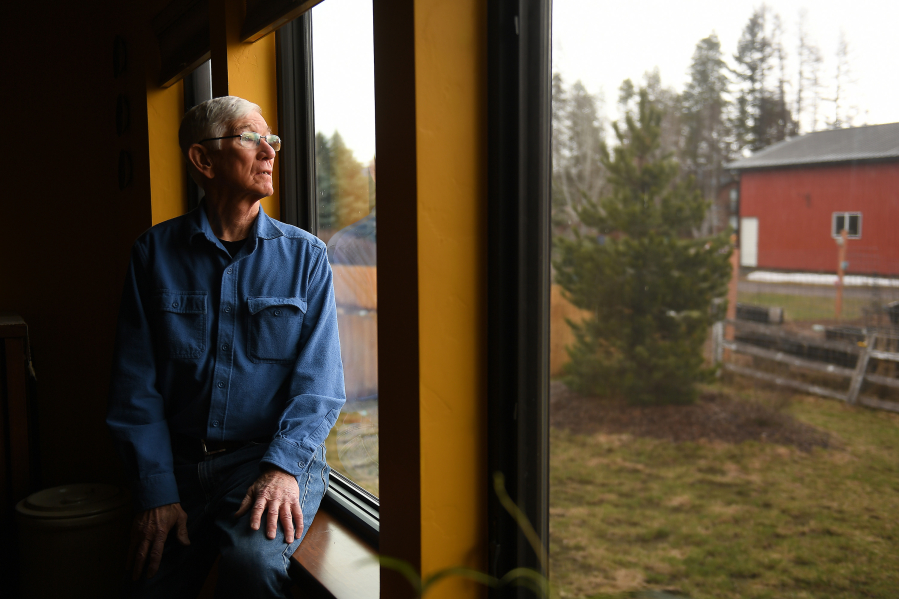WHITEFISH, Mont. — As images of dead Syrian children flashed across his television this month in Montana, David LeBleu prayed it would finally change minds.
“Could this be our chance?” he wondered.
LeBleu, 73, had been campaigning for a year to bring refugees to his tiny mountainside town of Whitefish, Mont. But in conservative Flathead County, he was making little headway.
Donald Trump had won the county with 65 percent of the vote in the presidential election and found widespread support there for his “America first” message and pledge to halt refugee resettlement nationwide. In that sense, the region wasn’t much different from a broad swath of the nation.
If the deaths of “beautiful babies” — as Trump had put it — in what the U.S. said was a poison gas attack couldn’t sway people, LeBleu figured nothing could.
“They don’t like newcomers here,” he said. “They want to just keep things the way they are, in the past.”
LeBleu himself is a newcomer, part of a wave of liberal-minded transplants drawn to Whitefish, Mont., population 6,357, for its natural beauty and slower pace of life. He moved from Long Island, N.Y., three years ago, following his daughter after retiring from teaching high school social studies and losing his wife to multiple sclerosis and cancer.
He was delighted that people would “talk to you on the street and ask how you were doing.” As a lifelong Christian, he was pleased to see churches everywhere.
But the faith that dominated northwest Montana was far more conservative than LeBleu had ever experienced.
To him, being a Presbyterian meant a life of public service and openness to other cultures. Back in New York, he sat on a refugee council at his church and once housed a Vietnamese refugee and her two sons. He joined churchgoers for a trip to refugee camps in the Middle East, and his church hosted a Coptic Christian priest from Egypt and a pastor from Syria.
But in Whitefish, Mont., the Presbyterian churches he visited were more interested in the Bible than the wider world and didn’t share his passion for women’s or gay rights.
LeBleu finally found a spiritual home alongside other liberal transplants at the Whitefish United Methodist Church. It was already working internationally to pay the salaries of Christian pastors in Angolan villages.
He saw an opportunity early last year after a photograph of a drowned Syrian boy went viral and a group of mothers in Missoula, a university town 130 miles south, were so moved that they launched an effort to take in refugees. Their plan to bring refugees to Montana for the first time in decades ignited a statewide debate and a string of demonstrations on both sides of the issue.
LeBleu’s response was to try to bring refugees to his town.
He put out a call in church for volunteers. There were enough like-minded residents — the town had voted for Hillary Clinton — that he had no trouble finding support.
But it was a different story in the county seat of Kalispell, Mont., a blue-collar town of 20,000 known for its gun manufacturers and conservative churches.
The town quickly became a hub of opposition to resettlement — and, on a rainy March morning last year, the site of a tense standoff.
LeBleu and about 70 pro-refugee activists, many from out of town, gathered in a park there with signs reading “Friendship not fear!” and “Stability, opportunity, peace for ALL.” Across the city’s main drag, a dozen or so residents stood with their own placards warning of the problems they believed Muslims would bring: “Europe’s murder and rape epidemic is REAL, not ‘fear’ ” and “Kalispell NEEDS SHARIA LAW.”
Some of the men carried guns.
The Flathead County commissioners took sides last spring, sending a letter to the U.S. Department of State saying they could not “support the relocation of refugees without a legitimate vetting process and an analysis of refugee impacts to our local community.”
A few weeks later, the first refugees — a family of six from the Democratic Republic of Congo — arrived in Montana. More families soon followed.
LeBleu figured the opposition would fade away as people saw that the refugees weren’t committing crimes, didn’t have diseases and didn’t want to impose Islamic law — and were mostly Christian.
He figured wrong.
On the presidential campaign trail, Trump’s anti-immigrant rhetoric was intensifying — and riling up fear in Montana. Trump’s victory only invigorated opponents to refugee resettlement.
It was hard for LeBleu not to read some letters to the editor of the local newspaper, the Daily Inter Lake, as personal attacks.
“How long do we have to tolerate leftists from other states coming here to bring ‘refugees’ from alien cultures to our cities? Cultures so far removed from our own that assimilation is impossible,” one said in December.
Eighty-one refugees from the Democratic Republic of Congo, Eritrea, Ethiopia, Iraq and Syria now live in Missoula, Mont.



